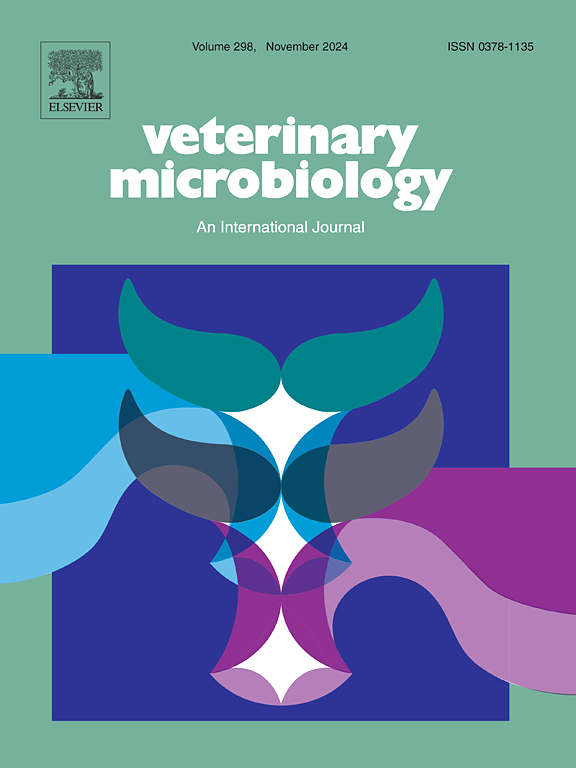Neutrophils undergo migration and produce an antiviral response following porcine epidemic diarrhea virus infection
IF 2.4
2区 农林科学
Q3 MICROBIOLOGY
引用次数: 0
Abstract
The importance of the host's initial innate immune and acute inflammatory responses in combating viral infections has increasingly garnered interest. Neutrophils are the initial responders to infection and inflammation; however, their specific function in the host's antiviral immune defence remains ambiguous. Here, we observed that the porcine epidemic diarrhea virus (PEDV), which is the primary pathogen responsible for diarrhea in newborn piglets, triggered the release of intestinal neutrophil-attracting chemokines, recruiting neutrophils to the intestinal epithelium and inducing an antiviral response. In the co-culture model of Vero cells (a cell line used to study the replication and dynamics of PEDV in vitro) and neutrophils, infection of Vero cells with PEDV facilitated the transepithelial migration of neutrophils. Additionally, direct contact between neutrophils and PEDV-infected Vero cells enhanced viral clearance. Transcriptome analysis revealed significant upregulation of C3 expression in Vero cells after neutrophils were introduced 6 h after PEDV infection, and the antiviral effect of neutrophils was diminished after siRNA-mediated knockdown of C3. Consistently, C3 expression was markedly upregulated in the small intestine of PEDV-infected piglets, supporting complement system activation. Furthermore, the supernatant from cells infected with PEDV has the capacity to increase the expression of antiviral agents such as β-defensin-2 and myeloperoxidase in neutrophils. Taken together, our results reveal the role of neutrophil recruitment in the antiviral response during enterovirus infection, highlighting the importance of neutrophilic activity in the host antiviral innate immune response.
中性粒细胞在猪流行性腹泻病毒感染后进行迁移并产生抗病毒反应
宿主初始先天免疫和急性炎症反应在对抗病毒感染中的重要性日益引起人们的兴趣。中性粒细胞是对感染和炎症的最初反应者;然而,它们在宿主抗病毒免疫防御中的具体功能仍不清楚。在这里,我们观察到猪流行性腹泻病毒(PEDV)是导致新生仔猪腹泻的主要病原体,它触发肠道中性粒细胞吸引趋化因子的释放,将中性粒细胞募集到肠上皮并诱导抗病毒反应。在Vero细胞(一种用于研究PEDV体外复制和动力学的细胞系)与中性粒细胞共培养模型中,PEDV感染Vero细胞促进了中性粒细胞的经上皮迁移。此外,中性粒细胞与pedv感染的Vero细胞之间的直接接触增强了病毒清除。转录组分析显示,在PEDV感染后6 h引入中性粒细胞后,Vero细胞中C3的表达显著上调,sirna介导的C3敲低后中性粒细胞的抗病毒作用减弱。与此一致,C3在pedv感染仔猪小肠中的表达显著上调,支持补体系统激活。此外,感染PEDV细胞的上清液有能力增加中性粒细胞中抗病毒药物(如β-防御素-2和髓过氧化物酶)的表达。综上所述,我们的研究结果揭示了中性粒细胞募集在肠道病毒感染期间抗病毒反应中的作用,强调了中性粒细胞活性在宿主抗病毒先天免疫反应中的重要性。
本文章由计算机程序翻译,如有差异,请以英文原文为准。
求助全文
约1分钟内获得全文
求助全文
来源期刊

Veterinary microbiology
农林科学-兽医学
CiteScore
5.90
自引率
6.10%
发文量
221
审稿时长
52 days
期刊介绍:
Veterinary Microbiology is concerned with microbial (bacterial, fungal, viral) diseases of domesticated vertebrate animals (livestock, companion animals, fur-bearing animals, game, poultry, fish) that supply food, other useful products or companionship. In addition, Microbial diseases of wild animals living in captivity, or as members of the feral fauna will also be considered if the infections are of interest because of their interrelation with humans (zoonoses) and/or domestic animals. Studies of antimicrobial resistance are also included, provided that the results represent a substantial advance in knowledge. Authors are strongly encouraged to read - prior to submission - the Editorials (''Scope or cope'' and ''Scope or cope II'') published previously in the journal. The Editors reserve the right to suggest submission to another journal for those papers which they feel would be more appropriate for consideration by that journal.
Original research papers of high quality and novelty on aspects of control, host response, molecular biology, pathogenesis, prevention, and treatment of microbial diseases of animals are published. Papers dealing primarily with immunology, epidemiology, molecular biology and antiviral or microbial agents will only be considered if they demonstrate a clear impact on a disease. Papers focusing solely on diagnostic techniques (such as another PCR protocol or ELISA) will not be published - focus should be on a microorganism and not on a particular technique. Papers only reporting microbial sequences, transcriptomics data, or proteomics data will not be considered unless the results represent a substantial advance in knowledge.
Drug trial papers will be considered if they have general application or significance. Papers on the identification of microorganisms will also be considered, but detailed taxonomic studies do not fall within the scope of the journal. Case reports will not be published, unless they have general application or contain novel aspects. Papers of geographically limited interest, which repeat what had been established elsewhere will not be considered. The readership of the journal is global.
 求助内容:
求助内容: 应助结果提醒方式:
应助结果提醒方式:


